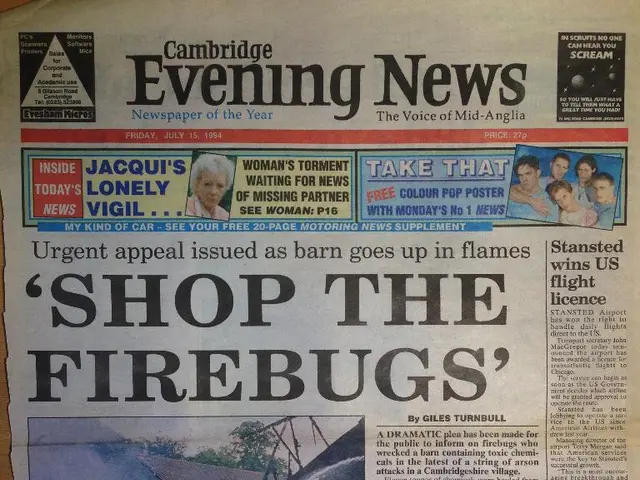Airbnb rentals in Florence's city center have reportedly faced a ban.
Updated Article:
Tourism Challenges in Florence: Rentals Ban and Overtourism Struggle
Wanna chat? Go ahead!
Florence, the picturesque Tuscan city, is grappling with a contentious issue over tourist rentals. The local city council has approved a ban on new tourist rentals in the historic center, but it's facing resistance from landlords and right-wing parties.
Tourist Rental Crackdown
In response to growing concerns about overtourism, the Tuscan city of Florence took a decisive step this week, banning new Airbnb rentals and other short-term tourist lets. Mayor Dario Nardella argued that too many residents are being displaced or forced to live in buildings that resemble "apartment-hotels."
The moved measures, which will take effect in the coming months, will not affect existing tourist rentals. However, landlords of these existing properties will be eligible for a three-year local IMU tax break if they switch to long-term leases.
Rising Costs and Living Conditions
According to Mayor Nardella, the number of apartments in Florence listed on Airbnb skyrocketed from 6,000 in 2014 to nearly 14,378 today. Over this period, average monthly rent prices surged by 42 percent, increasing by 15.1 percent just this year. In Nardella's words, a single room now costs at least 500 euros per month for residents.
"Florentines living in the center feel like they're in apartment-hotels," Nardella stated during a speech at city hall.
Controversy and Opposition
The decision to tighten tourist rental regulations has been met with resistance from local landlords and right-wing political groups. Opponents fear the new rules will hurt the local economy and potentially lead to illegal activities, as property owners resort to unconventional methods to generate income.
The Italian government is also drafting a national law to require a two-night minimum stay at rentals in popular tourist destinations like Florence. However, many, including Mayor Nardella, argue this won't be enough to combat overtourism effectively.
The Future of Tourism in Florence
While the new regulations have been widely reported as a complete ban on Airbnb rentals in Florence, it's essential to note that no new law has been implemented yet. The measures must undergo a 30-day observation period, during which amendments or final approval may be made.
Similarly, other Italian cities like Venice and Milan are contemplating restricting short-term rentals to alleviate housing pressures on residents. However, it remains to be seen how these decisions will impact the local housing market, tourism industry, and Italy's competitiveness in the global tourism market.
Other Perspectives
- Read more about the dwindling availability of long-term apartment rentals in Italy: ’Cause for Alarm’: Rent Increasing Steadily in Florence (The Times)
- Learn about Italy's rules and regulations for Airbnb rentals: Airbnb Rules Institute’s guide to renting your property on Airbnb in Italy
- Discover why more tourist destinations should limit numbers: Why More of Italy’s Top Destinations Must Limit Tourist Numbers (The Guardian)
- The Italian government is considering a national law requiring a two-night minimum stay at rentals in popular tourist destinations like Florence following the city's ban on new Airbnb rentals.
- The Italian city of Florence, known for its Tuscan lifestyle and historic architecture, is encountering opposition to its decision to tighten tourist rental regulations from local landlords and right-wing political groups.
- In response to the steadily increasing rent prices and housing pressure on residents, Milan and Venice are contemplating similar restrictions on short-term rentals.
- The unfolding events in Florence unequivocally demonstrate the Southern European country's ongoing struggles with overtourism.
- Mayor Dario Nardella argues the new regulations are necessary to address the growing concern of displacement and the proliferation of apartment-hotels in the historic center of Florence.
- The Italian government's proposed national law faces critiques from various stakeholders, including Mayor Nardella, who believe it is insufficient in tackling overtourism effectively.
- Despite the proposed national law, many fear it could lead to illegal activities as property owners resort to unconventional methods to generate income.
- Short-term tourist rentals have surged in Florence over the years, causing a 42% increase in average monthly rent prices since 2014.
- Controversy surrounds the Florence city council's approval of the ban on new tourist rentals, with right-wing parties, including Meloni's, voicing their opposition.
- The new regulations face a 30-day observation period before potential amendments or final approval, during which time the fate of existing Airbnb rentals remains uncertain.
- The average Florentine resident now faces housing costs, with a single room rental minimum of at least 500 euros per month.
- The growing concerns about overtourism in Italy extend to other aspects of life, including fashion-and-beauty, food-and-drink, home-and-garden, travel, education-and-self-development, entertainment, general-news, and crime-and-justice.
- In an effort to combat overtourism, Florence is considering a hard-line approach, adopting strict regulations that prioritize the needs of its residents over the tourism industry.







